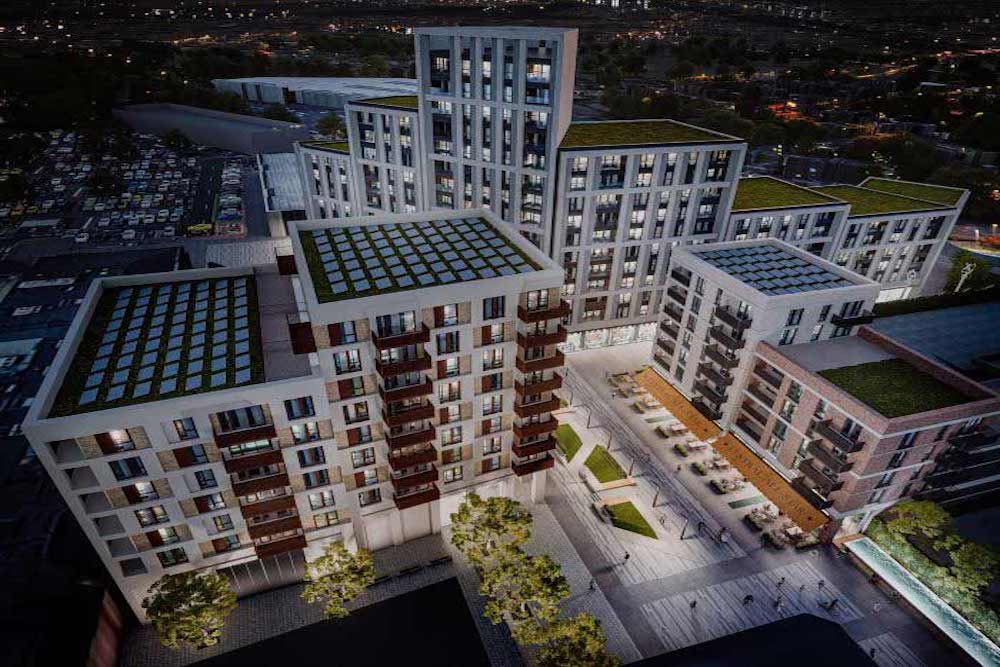
by Kim Pidgeon | Oct 30, 2023 | News
First grant of its kind after changes to the Affordable Homes Programme
Homes England has awarded a £5m grant from the Affordable Homes Programme to Somerset Council to support the North Taunton Woolaway Project.
The grant allocation is the first of its kind following Homes England’s decision in June 2023 that grant funding from the Government’s Affordable Homes Programme 2021-26 could be used to fund replacement homes, alongside new affordable homes, as part of wider estate regeneration plans.
North Taunton was identified for regeneration as it is an area with some of the county’s highest rates of social deprivation and contains some of the most energy-inefficient homes in Somerset.
The North Taunton Woolaway Project is a site comprising of non-traditional homes that were built using prefabricated reinforced concrete panels instead of traditional brick.
This type of construction is time-limited due to structural issues, therefore, demolishing these existing homes and replacing them is more beneficial. All new homes will be built to low carbon standards and will achieve EPC B or above.
In total, 162 energy-inefficient Woolaway homes will be demolished and replaced with 229 council homes for affordable rent. Homes England will be funding 66 of these new build replacement homes, with the remaining homes funded by Somerset Council.
Jackie Jacob, a director of Affordable Housing Grants said: “This funding is the first grant allocation following the introduction of our new flexibilities to support our partners plans for estate regeneration. The Agency’s new Strategic Plan objectives will support Somerset Council in its ambitions to regenerate North Taunton, an area with some of the highest social deprivation levels in the county.
“The North Taunton Woolaway Project is a signal of the funding open to affordable housing providers to accelerate the regeneration of social housing and help level up communities across the country.
“We encourage all providers and local authorities to come and talk to us as early as possible if they need support to develop their proposals – we’re here to help.”
The regeneration project will be rolled out across four phases, two of which will be part-funded by the Affordable Homes Programme to deliver 100 homes, including a variety of bungalows, flats and houses. The agency’s goal is that that this funding will enable the council to accelerate the delivery of phases three and four.

by Kim Pidgeon | Jul 27, 2023 | News
The Government announces a new era of regeneration, inner-city densification and housing delivery across England…
The Prime Minister Rishi Sunak and Secretary of State for Levelling Up, Housing and Communities Michael Gove have set out further plans for tackling the housing crisis.
Regeneration
Following the Levelling Up White Paper commitment to regenerate 20 places, three areas were highlighted as next in line for targeted action: Cambridge, inner-city London and central Leeds.
The proposals for Cambridge are designed to see the city become ‘Europe’s science capital’. Plans will address the issues constraining that title, including expensive property markets, limited lab space and high commercial property prices.
Plans for Cambridge envision new sustainable neighbourhoods, a quarter for cutting-edge laboratories and commercial developments, and life science facilities.
The government will deliver as much of the infrastructure and affordable housing as possible using land value capture – with the local area benefiting from the significant increase in land values that can occur when agricultural land is permitted for residential and commercial development.
A Cambridge Delivery Group will drive the project, leading on identifying the housing, infrastructure, services and green space required – along with delivery. Immediate action will address barriers to plans such as water scarcity across the city.
In addition to Cambridge, the government also announced a ‘Docklands 2.0’ vision in east London for up to 65,000 homes across multiple sites of significant scale including at Thamesmead, Beckton and Silvertown.
The plan states London will also see the benefits of the government’s decision to allow the Affordable Homes Programme to be directed towards regeneration for the first time – with up to £1 billion available in London alone. £1 million has also been made available to push forward work with the Mayor to consider how the government drive housing delivery in London, including looking at innovative new ways that industrial land can be released for housing.
For Leeds, the government will accelerate work in the centre by identifying the remaining barriers to delivery for key housing growth sites within the city, including the South Bank and Innovation Arc.
Also outlined were plans to continue working closely with local partners in Barrow-in-Furness to help make it a new powerhouse of the North.
That includes £800 million investment from the £1.5 billion Brownfield, Infrastructure and Land fund to unlock up to 56,000 new homes across England, and funding Homes England with £550 million. As previously announced, £250 million is being provided to Greater Manchester and West Midlands Combined Authorities.
Densification
Alongside targeting areas, the government wants to unleash building on underused sites in high-demand regions via densification. They state that the country’s inner cities have much lower population densities than comparable Western countries, impacting our productivity.
The densification plan therefore includes: a consultation on new Permitted Development Rights (PDR). New and amended PDR would make it easier to convert larger department stores, space above shops and office space. The plan also supports farm diversification and development.
Taking steps to unblock the bottlenecks in the planning system with a £24 million Planning Skills Delivery Fund to clear backlogs, a new “super-squad” team of leading planners to unblock major housing developments, and increasing the amount developers pay in planning fees to ensure all planning departments are better resourced.
Building safely
The government says it will not be complacent in its approach to safety – recognising that, “as work progresses to densify our towns and cities, people must be given unimpeachable confidence that new homes are safe and decent to live in.”
The government confirmed the intention to mandate second staircases in new residential buildings above 18m. It states this new regulation cannot jeopardise the supply of homes by disrupting schemes that have been planned for years, saying the DLUHC will work rapidly with industry and regulators over the summer to design transitional arrangements with the aim of securing the viability of projects which are already underway.
They will also open the Cladding Safety Scheme to all eligible buildings, ensuring that no leaseholder will be out of pocket to fix dangerous cladding in medium or high-rise buildings.

by Simon Fitzsimmons | Jan 20, 2023 | News
NHG plans for Aylesbury regeneration project take step forward
Plans for Notting Hill Genesis’ Aylesbury regeneration have moved onto the next stage with Southwark Council resolving to give planning consent on the site known as Phase 2B.
The application, submitted by the housing association, includes plans for over 600 new homes, commercial and community/learning space, two new public spaces, improved play and sport facilities and wide, tree-lined streets.
The mixed-use development comprises five buildings and delivers 50% affordable housing.
Each of the five blocks is designed by a different architectural practice and these offer a combination of housing types: mansion blocks, higher-rise apartments, courtyard apartments, and maisonettes.
The proposed masterplan for Phase 2B has been designed by Maccreanor Lavington Architects. They are joined by Architecture Doing Place, East, Sergison Bates Architects and Haworth Tompkins Architects
John Hughes, group director of development and deputy chief executive at Notting Hill Genesis said, “We welcome Southwark Council’s decision to approve planning permission for Phase 2B.
“Following extensive consultation with the community we feel satisfied that the plans provide much-needed new housing for the area, balancing the needs of existing residents while encouraging those from outside the area to become part of a well-established, thriving neighbourhood.
“While this is an important milestone, there are a number of further steps which must now be taken before we can start to deliver this project. These include receiving final approval from the Mayor of London and finalising our planning obligations (known as a section 106 agreement) with the council.”
Subject to final approvals, construction is anticipated to begin in March 2023 with site preparation and demolition works.
***
Plans for 6,500 new homes, with 50% affordable housing, on London Dockside site
Project plans have been submitted by The Silvertown Partnership for the 50-acre dockside location. They detail how the iconic Millennium Mills building, left derelict and largely disused for around 40 years, will be fully restored and form the centrepiece of the new community.
The £3.5bn development will include canal walkways, a paddle board club and new bridges.
The newly opened Custom House Elizabeth Line Station provides a transport link and is just 15 minutes from central London.
Plans state the new neighbourhood will also be one of London’s greenest, with all homes and commercial spaces supplied with hot water and heating powered through a zero-carbon district heating system.
The Silvertown Partnership is seeking full planning permission for phase one of the Proposed Development, which will include 1,248 new homes, including 610 affordable homes, and 82,328 sqm new commercial space. Outline permission is sought for the remainder of the site.
The Silvertown Partnership, which includes Lendlease, an international real estate and investment group, is working in conjunction with the Greater London Authority (GLA), Homes England and The Guinness Partnership (TGP).
Ed Mayes, project director for Silvertown, Lendlease said: “After months of working together with local residents and our public sector partners GLA, Homes England and the London Borough of Newham, I’m proud to present our vision for this iconic new neighbourhood.
“Silvertown is finally being reimagined as a vibrant new centre for the Royal Docks – a place where people can live and work well, better connected to the water and each other.
“This is a pivotal moment for the Silvertown development, as we reveal plans for a neighbourhood that will create thousands of much-needed new affordable homes and jobs for Newham. I look forward to continuing to work closely with the local community and our stakeholders to make this shared vision a reality.”
Catriona Simons, CEO at The Guinness Partnership added: “This planning application is a big milestone in creating a new future for the Silvertown site. As affordable housing provider for the first phase affordable homes, Guinness is proud to be part of this ambitious and exciting vision for the Silvertown neighbourhood.”
***
Planning application submitted for sustainable Cambourne development
The South Cambridgeshire Investment Partnership (SCIP) has entered a planning application for 256 new low carbon homes in Cambourne – including more than 70 affordable, net zero homes.
SCIP is a (50:50) partnership between South Cambridgeshire District Council and The Hill Group.
The planning application is for a new, sustainable residential development with community amenities and public open spaces within Cambourne Business Park in South Cambridgeshire.
The proposed scheme includes 256 new, low carbon, homes, of which 40% (102 homes) would be affordable. 70% of the affordable homes would be earmarked for affordable rent, with the remaining 30% of them being available for shared ownership.
72 affordable homes at the development will achieve net zero carbon through a fabric first approach, with Passivhaus levels of performance. This will be accomplished through high levels of insulation, airtight construction, air source heat pumps for heating and hot water, photovoltaic panels, and energy efficient building services and controls.
The whole development will be entirely gas-free, and each home is designed to help reduce water usage to not exceed 99 litres per person per day, lower than the 110 litres standard required by national building regulations.
South Cambridgeshire district councillor Richard Stobart, a SCIP Board member, comments: “We are aiming for a very high standard when it comes to the site’s green credentials, and this is evident through the plans we’ve submitted.
“Making new homes as energy efficient as possible has never been more important, with rising fuel bills and the cost of living crisis impacting residents across the country. By working together as a partnership and bringing our varied skill sets together, we hope to deliver a flourishing new community, which encourages residents to live more sustainably.”
A public consultation into the plans is underway and runs until Friday 24 February.

by Simon Fitzsimmons | Oct 14, 2022 | News
Sovereign Housing Association has purchased the Princes Mead Shopping Centre and two adjacent retail assets in Farnborough for £17.6 million.
The 61-000-home housing association acquired the 7.77 acre site from Knight Frank Investment Management (KFIM), on behalf of Local Pensions Partnership Investments (LPPI). The deal sees both KFIM and LPPI remain involved in the development project as overage partners.
Sovereign plans to deliver over 350 new homes on the town centre site, creating a residential-led, mixed-use regeneration of the central site in the borough of Rushmoor.
The housing association says the purchase is part of their strategy to meet the growing demand for affordable housing and contribute to the regeneration of towns and high streets; delivering quality homes in well-connected communities.
The planned development forms part of wider regeneration plans for the Farnborough town centre, being brought forward by Rushmoor Borough Council and the Rushmoor Development Partnership.
Their Civic Quarter masterplan incorporates a new leisure centre, civic hub and park, 1,000 new energy efficient homes, and new restaurant, food and beverage areas.
Tom Titherington, Chief Investment & Development Officer at Sovereign Housing Association said: “We are delighted to have acquired our second shopping centre, with a view to the longer-term regeneration potential of the site.
“As our high streets evolve, it becomes increasingly important for forward-thinking housing associations such as Sovereign to take a proactive role in regenerating our town centres, supporting our customers through the delivery of affordable homes and the successful re-imagination of our high streets.”
John Styles, Partner at Knight Frank Investment Management, said: “Having worked with Rushmoor to establish support for a substantial residential-led development scheme we are delighted to have sold the site to Sovereign Housing Association. We are confident that Sovereign will take the project forward maximising the benefits, particularly in terms of affordable housing provision for Farnborough.”

by Kim Pidgeon | Jul 17, 2019 | News
G15 housing association One Housing has announced home builder Countryside as a preferred development partner for the Camden Goods Yard regeneration project.
Subject to formalising contracts, One Housing has selected Countryside to enter into a 50:50 joint venture partnership. It will see the housing provider and home builder jointly planning, designing, funding and delivering a comprehensive regeneration of Gilbeys Yard and Juniper Crescent estates in Camden. The project is subject to a positive resident ballot and is planned over an eight-year period.
Juniper Crescent and Gilbeys Yard are located either side of Morrisons supermarket behind the Stables Market in Camden.
Currently, 202 homes are provided but the scheme will look to deliver around 650-700 units including new homes for the current residents.
Resident engagement has been made an an integral part of the regeneration project, with a resident steering group part of the procurement team to select the joint venture partner. Residents will also be provided with a landlord offer prior to a ballot in March 2020 to decide on the future of their estates.
Mike Johnson, group director of development, One Housing said: “Following a rigorous procurement process, we are looking forward to working with Countryside, our residents and the London Borough of Camden to deliver this project.
“Countryside share our commitment to providing high quality new homes. We were also impressed by their approach to resident engagement and their ability to demonstrate that they could deliver on added social value and community benefits.”
Andy Fancy, managing director, partnerships South (North and South), Countryside, said: “We are thrilled to be partnering with One Housing on this landmark mixed-use regeneration scheme in the heart of Camden.
“We are looking to deliver more than three times as many high-quality homes including affordable homes as well as ensuring that local residents benefit from attractive public open spaces and crucial local amenities – all vital in creating sustainable communities.”
Monika Petrasova, on behalf of the Residents Steering Group said: “We have been pleasantly surprised by the level of involvement in the regeneration project from the start. We were part of the moderation meeting, which has never happened before, and we also marked all the tender submissions”.




